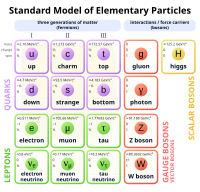
Photo from wikipedia
The algorithm behind particle methods is extremely versatile and used in a variety of applications that range from molecular dynamics to astrophysics. For continuum mechanics applications, the concept of ‘particle’… Click to show full abstract
The algorithm behind particle methods is extremely versatile and used in a variety of applications that range from molecular dynamics to astrophysics. For continuum mechanics applications, the concept of ‘particle’ can be generalized to include discrete portions of solid and liquid matter. This study shows that it is possible to further extend the concept of ‘particle’ to include artificial neurons used in Artificial Intelligence. This produces a new class of computational methods based on ‘particle-neuron duals’ that combines the ability of computational particles to model physical systems and the ability of artificial neurons to learn from data. The method is validated with a multiphysics model of the intestine that autonomously learns how to coordinate its contractions to propel the luminal content forward (peristalsis). Training is achieved with Deep Reinforcement Learning. The particle-neuron duality has the advantage of extending particle methods to systems where the underlying physics is only partially known, but we have observations that allow us to empirically describe the missing features in terms of reward function. During the simulation, the model evolves autonomously adapting its response to the available observations, while remaining consistent with the known physics of the system.
Journal Title: Scientific Reports
Year Published: 2020
Link to full text (if available)
Share on Social Media: Sign Up to like & get
recommendations!